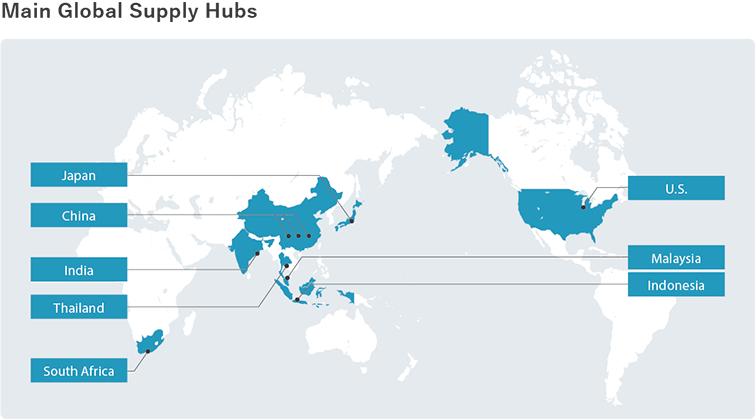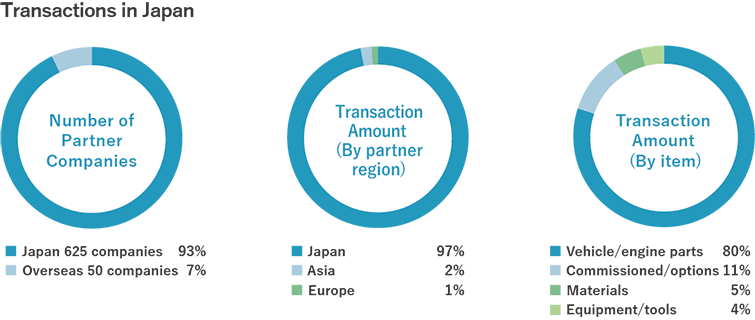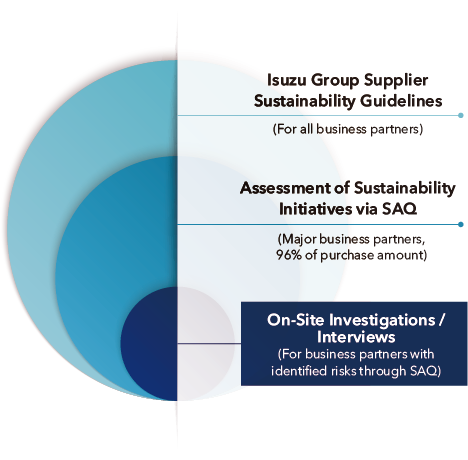- Sustainability TOP
- Social
- Supply Chain Management
Basic Approach
We will share and collaborate with our business partners on our PURPOSE, "Moving the World - for You," as outlined in the ISUZU ID, and work together in purchasing activities. We conduct open and fair transactions and maintain mutual communication with the various business partners involved in our supply chain to build relationships based on trust.
Basic Approach to Procurement Activities
Isuzu recognizes that gaining the cooperation and trust of its stakeholders, including its business partners, in the areas of Isuzu's activity such as the environment, quality, compliance, human rights, and community/social contributions, is extremely important to earning the trust of society, contributing to the sustainable development of society, and fulfilling its corporate social responsibility. To this end, it is working to address a variety of issues.
Isuzu established the Purchasing Basic Vision and Purchasing Basic Policy in 1997 to illustrate the direction of its procurement activities and maintain consistency across these activities. Our Purchasing Basic Vision and Purchasing Basic Policy are thoroughly communicated to new recruits and, through introductory training, to transferees from outside the Purchasing Division.
Many of the parts and other items used in Isuzu's products are purchased from external business partners.
The occurrence of a quality problem with purchased items or the manifestation of environmental, social, or business continuity risks affecting the supply may cause significant inconvenience to customers using our products. To prevent such situations, Isuzu is strengthening its monitoring system regarding quality management, as well as environmental, social, and business continuity measures. Going forward, Isuzu will continue its purchasing activities based on mutual trust with its business partners and will aim to establish a more resilient supply chain to ensure the stable procurement of quality products.
Purchasing Basic Vision
Isuzu ensures satisfactory quality, delivery and quantity of purchased parts so that smooth production is achieved through our purchasing activity. We also help to support the spread of new technologies through our purchasing activity in the market, and we strive to ensure our purchasing activity contributes to the profitability of the company. Our Purchasing Division ensures satisfactory quality, delivery and quantity of purchased parts.
(Established: July 1997, last revised: April 2008)
Purchasing Basic Policy
- With "quality" as the first priority, Isuzu seeks to create and offer products that would satisfy our customers.
- Isuzu aims to procure domestic or overseas parts, under fair competition, if the parts are satisfactory in terms of quality, pricing and delivery.
- Isuzu enhances corporate competitiveness while developing procurement schemes aiming to form win-win relationships with our business partners. Isuzu supports the objectives of the Declaration of Partnership Building, which aims to enhance the added value across the entire supply chain and establish a sustainable and mutually beneficial relationship with business partners. Isuzu has publicly announced its own the Declaration of Partnership Building.
Thorough Enforcement of the Purchasing Basic Vision and Purchasing Basic Policy among Purchasing Division Members
Our Purchasing Basic Vision and Purchasing Basic Policy are written in the Purchasing Division Compliance Guidebook, which is available on our in-house database for viewing by members of the Purchasing Division at any time.
Explanation about our Purchasing Basic Vision and Purchasing Basic Policy was added to the introductory training for transferees to the Purchasing Division in fiscal 2025. In this way, all employees of the division are thoroughly educated on the Basic Vision and Policy.
In addition, a seminar on the Act Against Delay in Payment of Subcontract Proceeds, etc., to Subcontractors and the Guidelines for Appropriate Trade in the Automobile Industry is held in an effort to encourage understanding about and compliance with the Act and the Guidelines which members of the Purchasing Division must know well.
Management Structure
Isuzu holds a Purchasing Division's Quality Meeting once a month reporting on and discussing topics such as the quality of the previous month's purchased parts, results of audits on new partners, and results of internal audits and external assessments related to ISO and IATF. The Purchasing Division holds a Quality and Compliance Promotion Meeting and an Environmental Meeting once a month. Information from these committees is passed on to all departments within the Purchasing Division. The Purchasing Division's policy on activities related to compliance and the environment is determined at these meetings.
Implementation of Departmental Education
New employees and other employees newly assigned to the Purchasing Division receive introductory training on compliance and sustainability. All division members are provided with seminars on the Act Against Delay in Payment of Subcontract Proceeds, etc. to Subcontractors and the Guidelines for Appropriate Trade in the Automobile Industry as appropriate.
Business Partner Consultation Service
We maintain a Business Partner Consultation Service within our Risk Management Dept. It offers impartial consultation service to our business partners, and accepts consultations from business partners regarding compliance issues.
Initiatives
Isuzu Supply Chain
Isuzu chooses its business partners according to a fair and equitable selection process regardless of whether they are based in Japan or overseas. Starting in 2023, we have incorporated sustainability assessments into our business partner selection process. We are engaged in purchasing activities aimed at mutual prosperity with our business partners and are implementing similar initiatives at our global procurement bases to strengthen Isuzu's competitiveness. Isuzu in Japan has a total of 671 domestic and overseas business partners. About 90% of these partners are based in Japan. In terms of transaction amount, the procurement of vehicle and engine parts makes up about 80% of the total.


Regional Development and Job Creation
In the countries and regions where Isuzu operates, Isuzu promotes the use of local parts to contribute to the development of the local automotive industry and employment.
Isuzu Group Supplier Sustainability Guidelines
Isuzu Group expects its business partners to meet high standards of social, ethical, environmental, and corporate responsibility. The Isuzu Group Supplier Sustainability Guidelines reference various Isuzu Group policies, including the Isuzu Group Human Rights Policy, the Isuzu Group Responsible Mineral Sourcing Policy, and other relevant Isuzu Group policies, as well as internationally recognized standards and frameworks.
If an event occurs in which a business partner fails to fulfill its social responsibility, not only will the image of Isuzu doing business with that business partner be damaged, but production activities will also be greatly affected, causing great inconvenience to customers who use Isuzu products. To avoid such risks, we ask our business partners to conduct their activities in line with the Isuzu Group Supplier Sustainability Guidelines, to strengthen their initiatives in human rights, environmental, and compliance areas, and to work together to share sustainability values across the entire Isuzu Group supply chain.
In these Guidelines (hereinafter referred to as “the Guidelines”), we clearly present the required practices in areas such as human rights, the environment, and compliance. Beginning in 2025, the scope of application will be expanded to include the entire value chain, with the aim of promoting shared sustainability values and driving initiatives throughout the value chain. Furthermore, the “Isuzu Green Procurement Guideline” has been integrated into these Guidelines to unify our policies. We ask our business partners to make active use of the Guidelines and to cooperate with us in realizing a sustainable society through their business with the Isuzu.
We kindly request our business partners to agree with Isuzu's principles and confirm their commitment to comply with the requirements of the Guideline for all products and services supplied to Isuzu, by signing an agreement. As of fiscal 2025, we have received signatures from business partners representing approximately 99% of our annual domestic purchasing amount. When contracting with new business partners, we request that they follow the Isuzu Group Supplier Sustainability Guidelines.
(Reference) Isuzu Green Procurement Guideline
The “ISUZU Green Procurement Guideline” was integrated into the “Isuzu Group Supplier Sustainability Guidelines” in 2025. For reference, the previous version of the guideline remains available for viewing.
Communication with Business Partners
Isuzu places great importance on close communication with its business partners through briefings and meetings. Through two-way communication with our business partners based on mutual trust, we understand the various activities of our business partners and offer support by inquiring if they have any concerns or difficulties. To continuously disseminate information more globally in the future, we are promoting the use of online tools. At the briefings, we also present Sustainability Awards to business partners that demonstrate outstanding commitment to sustainability, in addition to awards for on-time delivery, quality excellence, and other initiatives. We are confident that this kind of communication will contribute to strengthening the supply chain.
Main Opportunities for Communication with Business Partners
- New Year's business leaders' forums
- Procurement policy briefings
- Production briefings
- Quality policy briefings
- Isuzu Kyowakai*
- *Isuzu Kyowakai: A cooperative association comprising Isuzu's business partners
Evaluation of Business Partners' Initiatives Based on the Sustainability Guidelines
Isuzu regularly reviews and evaluates the status of its business partners' sustainability initiatives. Starting in 2023, our business partners who supply us with raw materials and parts are asked to complete a Self-Assessment Questionnaire (SAQ), which is a three-year cycle. The SAQ consists of questions in line with the Isuzu Group Sustainability Guidelines. As of fiscal 2025, we have received responses from 375 major business partners (representing approximately 99% of the annual domestic purchasing amount). We have identified sustainability risks at 10 of our current business partners. For those business partners whose risks have been identified, we conduct on-site or remote interviews and ask them to work on improvements. At the Group companies, we have disseminated our approach to sustainability and have initiated SAQs and on-site surveys at major overseas locations.
Approach to Surveying Sustainability Initiatives

Monitoring the Efforts of Our Business Partners
Quality
To monitor the delivery quality and market quality of our business partners, we calculate a monthly evaluation score based on factors such as the number of defect occurrences, the number of defects, and the severity of defects. As a result, business partners whose evaluation scores and defect counts do not meet a certain standard are selected to be companies subject to management, and business partners whose evaluation scores meet a certain threshold but have defect counts exceeding a specific limit are selected as companies subject to observation, indicating a need for improvement in delivery quality. We strive to improve delivery quality through efforts such as holding monthly quality meetings. In fiscal 2025, the quality of the deliveries improved and approximately 90% of our business partners attained the standard delivery quality evaluation score. None of the business partners was determined to be a company subject to management by failing to meet the required delivery quality standard. However, some fell within the definition of a company subject to observation. We joined these business partners in their improvement activities and encouraged them to strive for better quality.
In addition, we conduct an on-site audit of certain business partners when they undergo a triennial assessment for the renewal of a direct supply contract, to keep updated on their quality management structure operations. For our new business partners, we conduct an on-site audit before starting business relationships with them and evaluate the effectiveness of their quality management structures to see if they meet requirements for trading with us.
BCP
From the perspective of business continuity, there are risks from the production side, such as production plan changes due to shortages in parts supply and operation adjustments. These risks may include sudden supply disruptions due to natural disasters, long-term supply reductions due to infectious diseases, and recent geopolitical risks. In each case, numerous challenges need to be addressed both in the short and medium-to-long term.
We are continuously promoting the establishment of a BCP/BCM system for verifying the supply chain as well as tackling the challenge of visualizing the supply chain.
In the event of a disaster, we utilize our system to promptly request business partners to report the extent of the delivery impacts they are facing. In fiscal 2025, natural disasters and system failures actually occurred, and this system was used to confirm the situation and gather information.
Since fiscal 2024, we have also introduced a new system to understand the entire supply chain, and in fiscal 2025, we continued to collect and update information on the supply chain. We will continue to constantly update the information we collect and promote activities aimed at improving its accuracy.
Furthermore, as goals of these activities, we aim to identify vulnerabilities within the supply chain, pursue strategic inventory management, reduce production lead times, and address geopolitical risks that are becoming more apparent. Additionally, we are establishing a system that accelerates initial responses during disasters, working in cooperation with our business partners to ensure early recovery efforts and minimize the impact on Isuzu's business.
Environment
Isuzu requests that its business partners report their activities related to the promotion of environmental management structures through the Voluntary Assessment Report on Environmental Management. In fiscal 2025, we received responses from 359 business partners to this Report. The results showed a response rate of approximately 99%, an improvement over last year and a record-high average score to date. We confirmed that business partners are becoming more specific and sophisticated in their environmental activities.
Partner companies that are relatively proactive in their environmental activities showed an increased number of responses for specific plans and implementation details for the use of renewable energy. In addition, the number of responses regarding activities to reduce CO2 emissions, such as reducing the number of transportation operations and promoting modal shift, has also increased in the wake of the 2024 logistics problem. This confirms that the awareness of environmental activities among our business partners has further increased.
Additionally, we have utilized the CDP Supply Chain Program since fiscal 2023 to track our business partners' efforts related to climate change and GHG emissions. We received responses from 213 business partners, representing approximately 90% of our annual purchases, from those we requested to participate.
Main voluntary environmental assessment items
- Environmental management structures
- Notification of environmental personnel
- Compliance with environment-related laws and regulations
- Promotion of energy-saving activities
- Reduction of water consumption
- Reduction and appropriate treatment of waste
- Reduction of emissions of regulated chemical substances
- Submission of voluntary environmental management structure evaluation report
- Managing environmentally hazardous substances
- Reduction of CO2 emissions and packaging/shipping materials in logistics
Human Rights
Isuzu regards respect for human rights throughout the supply chain as an important responsibility and is committed to fair and sustainable procurement.
In particular, we are working on issues related to foreign workers, such as foreign technical intern trainees, as one of the most important human rights themes. In fiscal 2025, we conducted an on-site survey of the working conditions of foreign workers and introduced a consultation service regarding the issues of foreign workers in the supply chain.
Cybersecurity
We have been reviewing the JAMA/JAPIA cybersecurity guidelines towards our business partners to confirm and improve their cybersecurity measures. We kindly request that our business partners conduct a self-check using the Automobile Industry Security Checklist. In the future, we will continue to promote comprehensive cybersecurity measures among our business partners. To achieve this, we will conduct regular surveys to assess their improvement status and provide appropriate support from Isuzu as needed.
Moreover, we have conducted cybersecurity management system establishment and operational status checks for business partners handling products subject to UN-R155 and domestic regulations (Road Transport Vehicle Law Safety Standards) to ensure they comply with vehicle product cybersecurity requirements. (28 companies in fiscal 2023, 15 companies in fiscal 2024, 16 companies in fiscal 2025 / Total of 59 companies)
Furthermore, to ensure compliance with regulations, we will conduct checks on the vehicle product cybersecurity management systems of the relevant business partners.
Responsible Mineral and Raw Material Sourcing
Isuzu has been conducting surveys of its business partners' sustainability initiatives, including efforts regarding responsible mineral sourcing and human rights. Isuzu considers the use of conflict minerals to be a serious problem in the supply chain as these minerals cause human rights infringements, environmental destruction, and illegal mining in conflict zones, and are used to finance militant forces. Therefore, we request confirmation of non-involvement in conflict minerals upstream in the supply chain through the Isuzu Group Supplier Sustainability Guidelines. In addition, we have conducted surveys on the use of conflict minerals in our business partners' supply chains and the status of their initiatives for responsible mineral sourcing, using the CMRT and EMRT, which are standardized formats provided by Responsible Minerals Initiative* (RMI), starting in fiscal 2023. In fiscal 2024, we established the Isuzu Group Responsible Mineral Sourcing Policy.
- *Responsible Minerals Initiative: An organization based in the United States that addresses conflict minerals issues
Holding of Various Seminars
Environmental Activity Seminars
In response to information that regulations on the production and use of medium-chain chlorinated paraffins (MCCP) are expected to be initiated under the Stockholm Convention (POPs Convention), we held an environmental seminar by the Japan Auto Parts Industries Association (JAPIA) for our business partners in fiscal 2025. This seminar was attended by 127 relevant companies to deepen their understanding of how to comply with the regulations.
In fiscal 2025, to provide our business partners with a better understanding of Isuzu's environmental initiatives, we explained to them about our environmental activity plans, trends in chemical substance regulations, and Isuzu's policies at the supply chain issue briefing. The briefing was held twice a year, with 330 companies participating in each session.
Human Rights Seminars
To promote human rights due diligence initiatives in our business partners' supply chains, we hold a human rights seminar every year, inviting external experts. In fiscal 2025, we co-hosted with UD Trucks an online seminar titled Wellbeing Management Seminar on the significance of addressing wellbeing as a company and specific measures.
In fiscal 2026, we will continue to keep a close eye on the latest developments and plan to organize seminars related to human rights.

